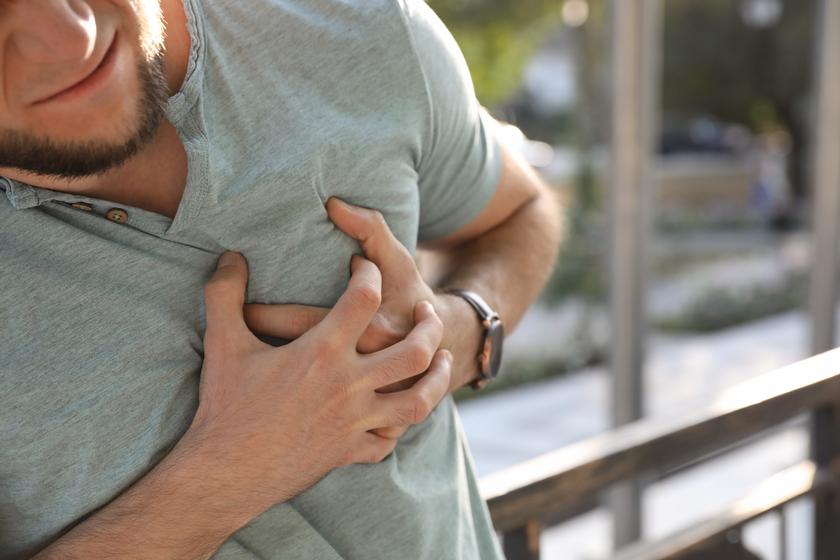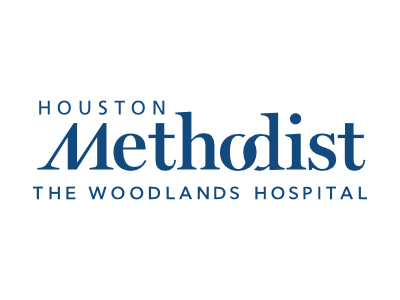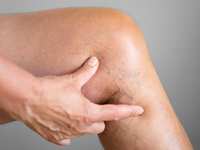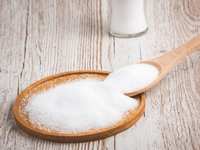Types of Chest Pain

By: Kim Rivera Huston-Weber
Experiencing chest pain might trigger a worry loop: Is it the heart? Gas? Heartburn? There are several types of chest pain and just as many causes. Let's look at when you should get help immediately and when you can wait to make an appointment with your doctor.
According to Dr. Numan Khan, an interventional cardiologist at Houston Methodist, discovering what causes chest pain comes down to its location and characteristics, as well as one's personal risk factors, including age and current health.
"I tell my patients that cardiologists are detectives for what's happening in your chest, right? And we're not just thinking about your heart," Dr. Khan says. "In your chest, you have the actual wall, which includes the bones, the muscle, and the cartilage. Then, deeper, you have the lungs, including the linings around your lungs and your heart. And then, even deeper, your esophagus runs right through the middle of your chest. And depending on what's affected, you can absolutely have symptoms that make you concerned about your heart, but the possible explanations are broad."
When thinking about chest pain, you want to ask yourself some questions to help gauge when chest pain is an emergency or when you can wait to see your doctor.
What is my current health like?
Knowing your family health history, your current health status and being honest about your lifestyle habits can be the lens for which you view chest pain or any concerning symptom of heart disease.
"If your dad had heart disease, if your mom had it, grandparents had it — your family risk profile matters," Dr. Khan says. "If your siblings have heart disease, that's even more concerning."
As we age, people may start to experience more chronic conditions that increase their risk of heart issues.
"If you've been told you have high cholesterol, hypertension or high blood pressure, if you have diabetes or even prediabetes, that means that you're at increased risk," Dr. Khan says. "If your doctor has ever diagnosed you with any of these conditions, you're at increased risk. Managing those predisposing conditions is important to lowering your risk, but even if you've been treated and everything's been pretty under control, it could still be that you have coronary disease."
Lifestyle habits such as smoking and eating habits that include saturated fats and lots of meat, dairy and cheese can increase your risk of heart trouble, too.
"When people come in with chest pain, I look at them as a person in terms of who they are and their risk profile," Dr. Khan says. "So, if you're 25, and you're telling me about chest pain, and it's very clearly related to food, then I'm thinking it is more likely to be indigestion and heartburn. If you're in your 40s or 50s, and maybe you do have hypertension, high cholesterol, and a family history — those same symptoms are potentially more concerning, so that's somebody who really needs to get checked out."
Types of chest pain — and what they could mean
Musculoskeletal
Dr. Khan says that if the chest pain you're experiencing can change with movement or any sort of physical maneuver, such as moving your arm or pressing on your chest, the odds that it is related to your heart are low.
"I like to counsel people to really move their arms and shoulders around and check that out," Dr. Khan says. "If you can change it in any way, if you can push on it, and it changes, that's probably something on the musculoskeletal side of your chest. Sometimes, it can mean you have costochondritis, which is an inflammation of the cartilage and the bones in your rib cage. Costochondritis is something that we often see and that can be from people going to the gym and exercising or using their body in a certain way that strains or sprains one of their costochondral joints. This is a common explanation for chest pain."
Inflammatory
If your chest pain changes with breathing or your body position, it may be due to an inflammatory condition. Dr. Khan says that patients often describe chest pain related to inflammation as a very sharp, painful sensation.
"Say you take in a deep breath, and it hurts and makes you say 'Ouch,'" Dr. Khan says. "That's when I start to think about things like pericarditis, which is inflammation of the lining around the heart. Or if you're laying down, and it hurts more, and then you sit up, and that feels better, those kinds of maneuvers are more consistent with an inflammatory kind of chest pain, something that is inflamed. That could be the pericardium, the lining around the heart. There could even be pleurisy. Pleuritis is pain associated with inflammation in the lining of the lungs."
Heartburn, aka acid reflux or upset stomach
After a particularly rich meal, you might feel a burning pain in your chest. The pain is usually behind your breastbone, and it usually worse right after eating or when you lie down or bend over. This sensation is called heartburn, which is caused by acid reflux, the backflow of stomach acid into the esophagus.
If you think you're having heartburn symptoms, Dr. Khan advises trying over-the-counter medicines, such as famotidine (branded as Pepcid) or antacid tablets.
"If you try a medication and your symptom is reliably going away as soon as you treat it with an antacid, for example, then you can probably rest assured that it's acid reflux, heartburn," Dr. Khan says. "Now, we don't like to assume that heartburn is heartburn in everyone. Heartburn/indigestion-type symptoms can also be from your heart and be signs of coronary blockage that we need to investigate. If you have some risk factors, don't just assume it's heartburn or your GI tract — it could be your heart."
So when should you worry it's not heartburn? If you're having heartburn or GI-style symptoms, but you're experiencing them at an odd time when you haven't had any food, or you're a person who has never had heartburn, and it's unusual, Dr. Khan says you should be checked out immediately for signs of heart disease or a coronary blockage.
Anxiety and panic attacks
It should come as no surprise that when we're feeling anxious or upset, there can be physical manifestations of what we're feeling emotionally.
"Anxiety is probably one of the more benign explanations for chest pain," Dr. Khan says. "But you feel your mind here, too, right? You can feel anxiety in your chest. Those physical manifestations of anxiety can often mimic something like heart disease or coronary disease."
Panic attacks are intense episodes of anxiety that can elicit symptoms such as a pounding or racing heart, chest pain, sweating, chills, tingly hands and even trouble breathing. The episodes pass, and breathing exercises often help the symptoms abate. The physical symptoms of panic attacks are usually not harmful to your health in the long term but can be very scary in the short term.
Coronary blockages (better known as heart attack)
Say you experience chest pain when running, exercising or exerting yourself. When you stop, so does the chest pain. But when you start exerting yourself again, the chest pain returns. Dr. Khan says this type of chest pain is one that definitely needs to be evaluated.
"Maybe you have a blockage in one of those blood vessels that supply oxygen to the heart," Dr. Khan says. "That's what brings out the symptoms of coronary artery disease — it can be described as a throb, can feel like pressure. Some describe it like a squeezing sensation."
Such blockages are hallmarks of coronary artery disease (CAD), which causes heart attacks when it becomes acute. CAD can also be chronic, where the arteries narrow over the years and people feel symptoms but can manage them with treatment. You may have CAD for a number of years and not know it until you have a heart attack, when the plaque in an artery suddenly ruptures and creates a blockage that halts blood flow to the heart.
Pulmonary embolism
Chest pain can also be a symptom of a pulmonary embolism, or an artery blockage in the lung. These blockages are caused by blood clots traveling from the legs or other parts of the body into the lungs.
"You're at risk for pulmonary embolism if you've had swelling in your leg or pain in one of your legs, or maybe you've had a recent surgery, and you've been immobilized for a while," Dr. Khan says. "And then suddenly you have sharp chest pain, and you'll also feel short of breath often. People will also sometimes pass out when a pulmonary embolism happens."
Pulmonary embolism is an emergency, notes Dr. Khan. It can be fatal or cause serious complications if not treated promptly.
When is chest pain an emergency?
It's safe to say no one wants to experience a health emergency for themselves or a loved one. But, if you or someone you love experiences chest pain and has any risk factors, it's better to be safe than sorry when it comes to getting emergency care for chest pain.
If chest pain appears, and it's relentless, Dr. Khan says it's better to get evaluated immediately than to try to sleep it off.
"I really worry when people tell me that they're having nausea, or they're having sweats, and they're just drenched all of a sudden along with chest pain," Dr. Khan says. "It's also concerning if that pain travels anywhere, if that pain travels up your neck, down your arm or to your back. Some people present in atypical ways – they could have primarily back or shoulder pain or primarily arm pain or jaw pain. All of those can potentially be a coronary blockage."
Additionally, Dr. Khan says chest pain that worsens and starts occurring more easily can be a red flag.
"If last week you could exercise, or you could run before you started to feel symptoms, but now even with walking the pain is there, that's potentially an unstable situation that requires an emergent evaluation," Dr. Khan says.
No matter your age, Dr. Khan emphasizes that if you're concerned about chest pain, seek an evaluation with a cardiologist.
"There are certainly times where people come in, and we can reassure them that it's something else, and it's probably going to be OK," says Dr. Khan. "Or sometimes we're pretty confident, based on what you're telling us, that it's coronary disease, and we're going to evaluate you for that with a stress test. But then we also get patients who come to the clinic showing scary, unstable kind of symptoms. And we take them down to the ER right away and take care of them."
"So if you're ever in doubt, the safest thing to do is to go get checked out," says Dr. Khan.

















